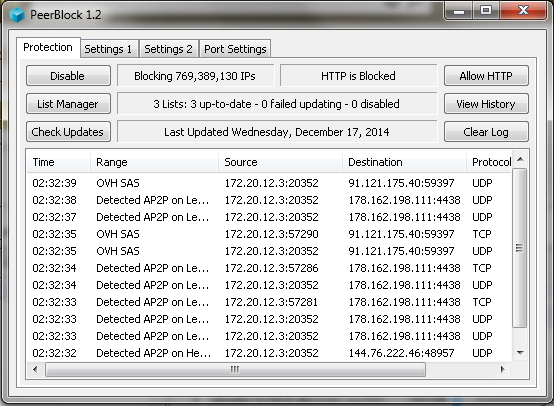PeerBlock, along with it’s predecessor PeerGuardian, has been around since 2003 as one of the first ways to protect file sharers from unwanted attention from anti-p(r)ivacy outfits and everyone else trying to analyse and track the networks, such as government agencies. Is it really worth the effort to install this free software to your computer, and how effective is the protection?
To answer this question, we decided to give the tool a review and take a good look at the methodology behind it. So what does the software actually do?
Based upon the concept of IP blocking, PeerBlock scans your computer for in- and outgoing connections to IPs (Internet addresses) deemed malicious or unwanted, for example because they’re owned to a Hollywood film studio, a known publisher of any kind of copyrighted material, an agency and so on. Also on the list are spyware and advertising companies, which helps block unwanted programs on your computer to annoy you with popups and similar crap.
How do they know what to filter and what not? Well, since around 2006 a company named Bluetack provides the standard list, and they come up with the presumably right entries by scanning the Internet for IPs registered by groups or companies considered bad for any reason.
Testing the software
It’s been a long time since the first release, and around 6 years ago, this little Windows-only program (Windows 7 is also supported by PeerBlock) was running on a lot of computers, particularly from people interested in data exchange, eDonkey2000, torrents – you name it, so it was interesting to see how little had changed since then.
After running the installer (download PeerBlock from the official website), we were asked to select some categories to filter (we choose P2P, spyware and advertising, resulting in an impressive list of 769,389,130 IPs), if we want to block HTTP for these IPs (if you decide to allow this, you’ll still be able to visit websites hosted on them or see ads from them) which is recommended, and after a brief update, the interface popped up.
Everything is easy enough to understand: along with some settings a list of blocked connections is displayed and updated in realtime, along with the alleged reason for it. For our testing, we fired up uTorrent and selected a torrent for Ubuntu, a common, free Linux distribution, and within seconds the list started filling up like crazy. Just look at the screenshot: Doesn’t that look impressive? It certainly helps to feel protected, and on top of that, PeerBlock also blocked uTorrent from displaying annoying ads.
Our computer didn’t seem to slow down much either, with the task manager reporting almost no RAM and only 0-1% CPU usage, so it doesn’t seem like modern computers have any problems with it, which was definitely not the case on older systems.
So, from the technical side, everything seems fine and dandy, and the blocking of advertising is definitely a nice add-on.
Critics speak up: Can PeerBlock protect you from lawsuits and copyright warnings?
What about the efficiency of the underlying principle: Is this program able to replace other protection such as VPNs? Critics point out that someone seriously trying to track you won’t use any IPs listed on PeerBlocks lists or any other list, and that the lists can’t always be up-to-date. “Good” peers on P2P networks are also said to get blocked frequently, so that users actually loose speed and potential sharing partners, and even the game servers from Battlefield 2, Blizzard, Steeam and ArenaNet get blocked, causing serious trouble for many gamers.
It is possible to add IPs to a custom “White List” or to manually disable the program while playing, but this still can be very annoying or mislead people into thinking the game is broken. Also, a false feeling of security might lure people to become careless, and engage in activities which might harm them (downloading copyrighted material, for example).
So what is true? On their website, the PeerBlock team points out that:
[blockquote cite=”PeerBlock FAQ” type=”left, center, right”]In fact some people believe that using blocklists like this are completely useless. Others disagree, and believe that even if it’s not 100% safe, it still lets them download files more safely. Sometimes they invoke the “Bear Principle”: when running away from an angry bear you don’t need to be faster than that bear . . . you only need to be faster than the guy next to you.[/blockquote]
Is PeerBlock Safe?
In 2007, file sharing enthusiasts from Slyck.com released an article, titled “MediaDefender Leak Offers BlueTack Users a Reality Check“, in which compared a leaked list of IP addresses of anti-piracy outfit MediaDefender with the Bluetacks list and concluded that only 1,09% of their IPs were on the blocklist.
In a discussion on PeerBlock forums, several people pointed out alleged inaccuracies in this article. So how effective is PeerBlock in practical use? Forum user Bluepeas tells his story of how he used torrents for years and never had any problems, while he received two notices within a short time period when he accidentally forgot to install the software on his new PC. But of course, this kind of evidence is very anecdotal and should not be taken as gospel.
However, Bluetack has been critizised several times for blocking IPs from completely harmless sites, such as the CCC, a well-known organization supporting file sharing, for dubious reasons. Find out more on Wikipedia.
Also, look at our test above.
The verdict:
While using PeerBlock might have advantages, several issues spoil the fun. Personally, we don’t think it’s worth it: Protection is not nearly strong enough to unsubscribe from your VPN service or download without worry. If you need privacy and want to share files, get a VPN, period – anything else is a very risky gamble indeed.





